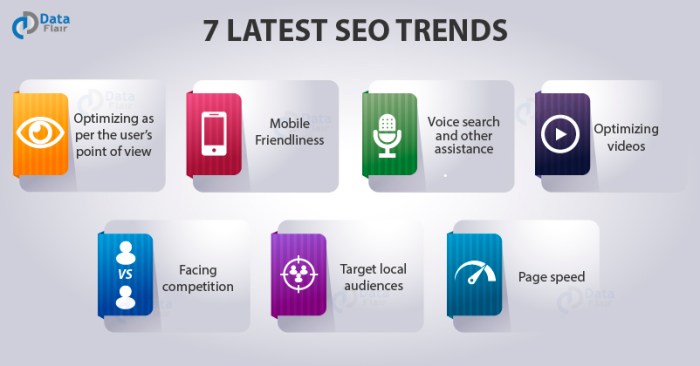Understanding SEO Trends – Kicking off with Understanding Trends, this opening paragraph is designed to captivate and engage the readers, setting the tone for what’s to come – a deep dive into the world of trends and their impact on online visibility and organic traffic. As we explore the importance, current trends, future predictions, and implementation strategies, get ready to level up your game!
Importance of Trends: Understanding SEO Trends
In the fast-paced world of online marketing, staying updated with trends is crucial for businesses looking to stay ahead of the competition. trends play a significant role in determining a website’s online visibility and organic traffic, which are essential factors for generating leads and increasing revenue.
Impact on Online Visibility and Organic Traffic
trends can greatly impact a website’s online visibility by affecting its search engine rankings. By following the latest trends, businesses can optimize their websites to rank higher on search engine results pages (SERPs), making it easier for potential customers to find them online. This increased visibility can lead to higher organic traffic, as more users are likely to click on a website that appears at the top of search results.
- Companies that have successfully implemented trends include:
- 1. Amazon: By optimizing their product listings and incorporating relevant s, Amazon has seen a significant increase in organic traffic and sales.
- 2. HubSpot: Through the use of topic clusters and pillar pages, HubSpot has improved its search engine rankings and website traffic.
- 3. Airbnb: By focusing on local and user-generated content, Airbnb has enhanced its online visibility and attracted more users to its platform.
Current Trends

In 2021, the world of is constantly evolving, with new trends emerging to keep up with the changing landscape of search engines. Let’s dive into some of the latest trends that are shaping the digital marketing industry.
Increased Emphasis on User Experience
One of the major trends in is the increased focus on user experience. Search engines like Google are placing more importance on factors such as page speed, mobile responsiveness, and overall usability of websites. Websites that provide a seamless and enjoyable user experience are more likely to rank higher in search engine results pages.
Content Quality and Relevance
Quality content has always been crucial for , but in 2021, search engines are becoming more sophisticated in evaluating the relevance and value of content. Creating high-quality, informative, and engaging content that answers the user’s query is key to ranking well in search results.
Voice Search Optimization
With the rise of voice assistants like Siri, Alexa, and Google Assistant, optimizing for voice search has become a significant trend. Marketers need to focus on long-tail s, natural language queries, and creating content that is tailored for voice search to stay ahead of the competition.
Mobile-First Indexing
Mobile-first indexing is another important trend in , where Google primarily uses the mobile version of a website for indexing and ranking. This means that websites need to be mobile-friendly and provide a seamless experience on smartphones and tablets to rank well in search results.
Video Content Optimization
Video content is gaining popularity and search engines are giving more weight to video results in search rankings. Optimizing video content with relevant s, engaging thumbnails, and descriptive titles and descriptions can help improve visibility on search engines.
Local
For businesses targeting local customers, optimizing for local is crucial. With the increasing use of location-based searches, businesses need to ensure their NAP (name, address, phone number) information is consistent across all online platforms and directories.
Predicting Future Trends
When it comes to predicting future trends, it’s important to stay up-to-date with the latest advancements in technology and user behavior. By analyzing current patterns and developments, we can make educated guesses about what the future holds for .
Role of Artificial Intelligence
Artificial intelligence is expected to play a significant role in shaping upcoming trends. AI-powered tools can analyze vast amounts of data at speeds that humans could never achieve, helping to identify patterns and insights that can inform strategies. As AI continues to evolve, we can expect more personalized search results, voice search optimization, and improved user experience to be key focuses in the future of .
Influence of User Behavior
User behavior is a crucial factor that can influence future trends. As search engines become more sophisticated in understanding user intent, businesses will need to focus on creating high-quality, relevant content that meets the needs and expectations of their target audience. Factors like dwell time, click-through rates, and social signals will continue to impact search engine rankings, making it essential for strategies to prioritize user engagement and satisfaction.
Implementing Trends

In order to successfully implement new trends into an existing marketing strategy, it is essential to design a roadmap that Artikels the steps to optimize content based on current trends and details the process of monitoring and adjusting strategies based on evolving trends.
Designing a Roadmap
- Conduct a thorough audit of your current strategy to identify areas for improvement.
- Research and stay informed about the latest trends and updates in the industry.
- Set clear goals and objectives for integrating new trends into your marketing strategy.
- Create a timeline with specific milestones for implementing and testing new strategies.
Optimizing Content, Understanding SEO Trends
- Optimize website content with relevant s based on current trends and best practices.
- Create high-quality, engaging content that is valuable to your target audience.
- Utilize meta tags, headers, and structured data to enhance visibility in search engine results pages.
Monitoring and Adjusting Strategies
- Regularly track and analyze key performance indicators (KPIs) to measure the effectiveness of your strategies.
- Use analytics tools to monitor website traffic, rankings, and user engagement.
- Stay flexible and be prepared to make adjustments to your strategies based on evolving trends and algorithm updates.